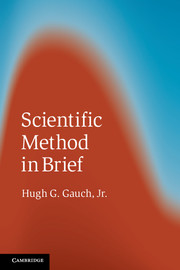Book contents
- Frontmatter
- Contents
- Foreword
- Preface
- 1 Introduction
- 2 Four bold claims
- 3 A brief history of truth
- 4 Science's contested rationality
- 5 Science's presuppositions
- 6 Science's powers and limits
- 7 Deductive logic
- 8 Probability
- 9 Inductive logic and statistics
- 10 Parsimony and efficiency
- 11 Case studies
- 12 Ethics and responsibilities
- 13 Science education
- 14 Conclusions
- References
- Index
2 - Four bold claims
Published online by Cambridge University Press: 05 November 2012
- Frontmatter
- Contents
- Foreword
- Preface
- 1 Introduction
- 2 Four bold claims
- 3 A brief history of truth
- 4 Science's contested rationality
- 5 Science's presuppositions
- 6 Science's powers and limits
- 7 Deductive logic
- 8 Probability
- 9 Inductive logic and statistics
- 10 Parsimony and efficiency
- 11 Case studies
- 12 Ethics and responsibilities
- 13 Science education
- 14 Conclusions
- References
- Index
Summary
This is the first of five chapters (2–6) directed mainly at this book's purpose of cultivating a humanities-rich perspective on science. The following five chapters (7–11) are directed mainly at this book's other purpose of increasing scientific productivity.
Consider a familiar scientific fact: water is composed of hydrogen and oxygen, having the chemical formula H2O. The objective of this and the following chapter is to comprehend exactly what claims science makes for such findings. Accordingly, this chapter explicates the concepts of rationality, truth, objectivity, and realism. Mainstream science uses these four concepts incessantly, although usually implicitly, so the philosophical literature on these concepts can enrich scientists’ understanding of their own craft. The next chapter explores the historical development of the concept of truth as applied to knowledge about the physical world, from Aristotle to the present. Finally, toward the end of the next chapter, additional scientific information will be presented to complete this story about science's rational, true, objective, and realistic knowledge that water is H2O. Science worthy of the name must attend not only to facts about electrons, bacteria, humans, and galaxies but also to concepts of rationality, truth, objectivity, and realism.
- Type
- Chapter
- Information
- Scientific Method in Brief , pp. 21 - 33Publisher: Cambridge University PressPrint publication year: 2012



